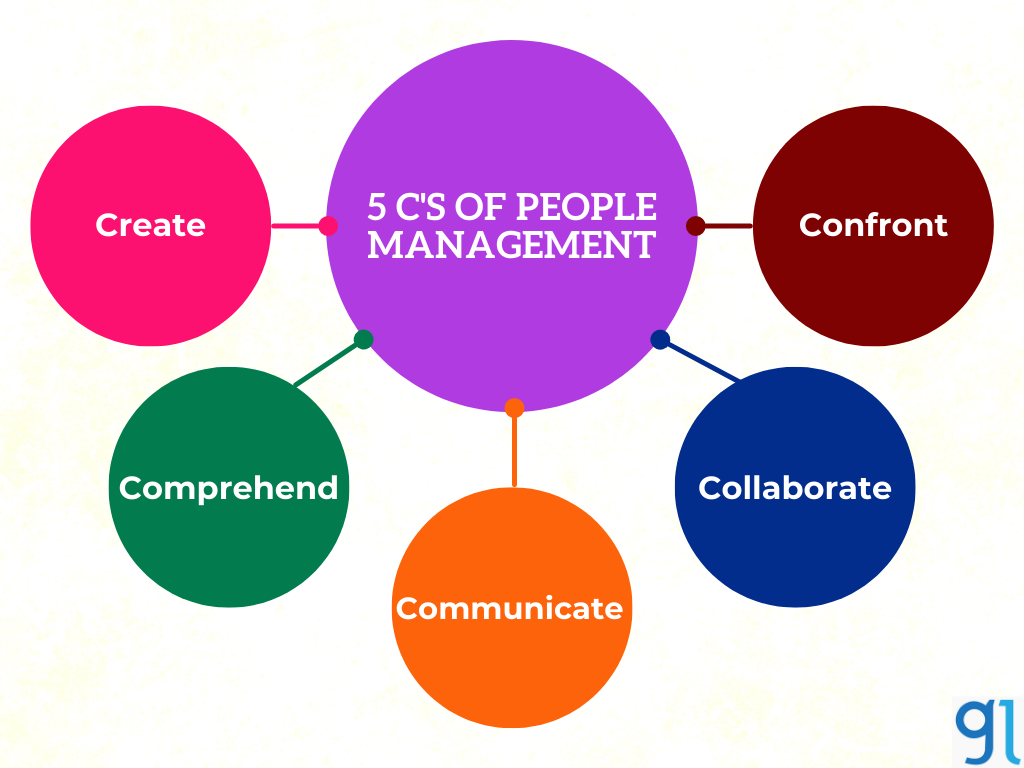As a successful manager, you would be expected to implement your years of experience and technical expertise to get the job done effectively. However, to build that trust and relationship with your team members, there is yet another set of skills that you must possess. Popularly known as “people management skills” in the corporate industry.
In order to effectively manage people, you must first establish connections with your fellow employees. A solid manager-employee relationship can provide your subordinates with the drive and encouragement they need to put in long hours, advance in their positions, and take on new challenges and responsibilities in their line of work. A good manager can hone the particular skills required to build these connections with effort and practice.
In this blog, we will learn more about what we mean by people management and what are the most important people management skills one should definitely have.
- What is People Management?
- The 5 C’s of People Management
- Essential People Management Skills You Must Have
- Conclusion
What is People Management?
People management is described as a collection of techniques that cover the full spectrum of hiring, training, and retaining talent while offering ongoing support to the company’s operations and direction to its staff.
All facets of how people perform, act, participate, and evolve at work are thus covered by the umbrella of people management, a crucial subset of human resource management. The procedures used to manage people have an impact on how the entire organization functions. Thus, they must be followed religiously without losing sight of the overall goal.
The 5 C’s of People Management
Now that we have a fair idea of what people management is all about. Let us look at the 5C’s of people management that drives it.

Create
Create a team that will help you grow. Every member of this team should be able to fit into their respective roles. There are three key elements that you must focus on during this entire process.
The first is hiring, which is the cornerstone of any business’s success. You can’t assume a company to achieve its goals if the right folks are not hired. Hire individuals with the appropriate skillset that serves the company’s purpose.
The second component is training. Offering people the skills they require to perform well is essential. Do a skill gap analysis and train the folks wherever they’re lacking. They will be appreciative of the investment and commitment in addition to being better equipped and more productive.
Finally, a competent manager must establish limits and have a proper team structure. This will allow your team members to efficiently work towards success and have a disciplined framework at all times.
Comprehend
A greater grasp of the present and future. Understanding the individuals who make up the team and the overall organization, their motives, characteristics, and professional and personal aspirations, is essential to effective people management. Greater shared knowledge of people and groups can be achieved through empathy, active listening, and a people-first mindset.
It’s critical to recognize that everyone differs from one another and has unique personalities and aptitudes. Despite the existence of tech-enabled methods to mine data, the age-old practice of “management by wandering around” has altered with time, and spending actual time with people always yields richer results.
Communicate
Creating pathways for open and transparent communication. The success of your teamwork depends on how well you communicate. Open lines of communication and constructive criticism are powerful tools for improving people management. An employee’s impression of the bigger picture to which they contribute is significantly influenced by the communication style and culture that is being followed in their workplace.
In order to encourage employees to communicate frequently, effectively, and without any hesitation, organisations must make sure they are giving them the proper channels and feedback. This will encourage and motivate the employees to the core.
Collaborate
Work together to create smarter & stronger outcomes. Better people management requires an acceptance that work cannot be done in isolation, even for projects involving a single team member. Both failure and achievement involving activities are performed by the team members only. Managers must ensure that delegating and sharing provide the greatest outcomes by utilizing the large range of collaboration technologies currently offered in the industry.
Employees need to be given tasks they can strive to and accomplish with good team collaboration to provide value to the company. Employees who collaborate with others at work can better understand their own and others’ contributions to specific tasks and the organization’s overall goals.
Confront
Handling differences of opinions in a healthy manner. In a team, there will be people from different backgrounds with different viewpoints. Now, this almost always results in unavoidable conflict. Such conflict may be physically represented in one of two ways: overtly and actively or covertly and passively.
In order to prevent resentment and negativity from spreading throughout the team or to prevent it from strengthening, the manager must choose how to handle this issue. Here, we use the word “confront” to refer to facing, acknowledging, and constructively addressing these conflicts rather than antagonizing them.
Essential People Management Skills You Must Have
“People leave managers, not companies”. Do you believe in this saying? We feel that this is true to an extent. If the management believes in healthy communication, helps you understand your job well, addresses your issues, gives timely feedback, and is transparent about everything, then why would anyone be dissatisfied with their jobs? Let us look at the most essential people management skills that you must have as a manager.
Trust
Establishing trust is an essential people management skill when it comes to developing a strong team. Managers are regarded as facilitators when they foster a sense of trust, give their team members the impression that they have their backs, and permit them to take calculated risks while still pursuing reasonable objectives. The capacity to develop trust is a long-term approach that has the potential to foster an environment of sincerity and openness.
Communication
Being a successful manager requires excellent communication skills, which can help give job clarity and satisfaction to all the employees.
A great leader must be able to communicate ideas and goals to motivate others, emphasize the importance of work, coordinate the plan of action with employees, and get along with every team member easily.
Empathy
Being empathetic is a quality every manager must have, whether it be for task assignments, communication, or constructive criticism. It is the capacity to grasp another person’s viewpoint fully and their motives, concerns, challenges, and strengths, rather than merely being capable of placing oneself in their shoes. Active listening makes it possible to see behind the pretenses we frequently put up in our social and professional interactions, which opens the door to deeper empathy.
Patience
It can sometimes be challenging to lead a team, and you may feel as though nothing is going according to plan. It’s imperative that you have patience as a manager, even though this could get unpleasant.
Maintaining composure, controlling emotions, and having a positive mindset when a challenging circumstance or mistake occurs are essential.
You won’t react in a way that could undermine relationships and lose trust if you keep your composure. Others will view your capacity to respond appropriately and without being driven by emotion as a powerful asset, and your employees will feel free to discuss issues with you.
Appreciation
Recognition and rewards for a job well performed are a vital part of managing employees. This affects how each individual views their job and the outcomes of their efforts and how the company evaluates achievement and responds to it. The practice of showing appreciation can foster a culture of thankfulness at work, which in turn would improve the working conditions of employees.
Problem-solving Skills
A manager’s work includes addressing problems on a regular basis. There are always issues to be resolved, and a brilliant manager tries to spot problems and solve them before they grow into larger issues; to achieve this, you must have exceptional attention to detail.
Honesty
If you wish to create a great team that has mutual respect for one another and for you, honesty is crucial. That entails being honest both in favorable and unfavorable circumstances. It also entails speaking the truth even when doing so is not in your best interests. However, if your team witnesses you acting honestly at all times, they will look to you as an inspiration and imitate your actions.
They will interact with one another and work more effectively as a result. Your team will come together and will be able to solve any issue that comes their way.
In A Nutshell
You are likely to apply people management skills as a manager more effectively the more you understand your management style and your team members. These above-mentioned key qualities, taking up MBA Courses and upskilling enable managers to get the most out of individuals reporting to them, increasing productivity and involvement and creating a stronger team. Wherever you are in your management career, it’s critical to keep in mind that people management skills can be developed, honed, and perfected just like any other skill set.
While you’re at it, why not enrol yourself in a free people management course and start acquiring those much-needed skills?






